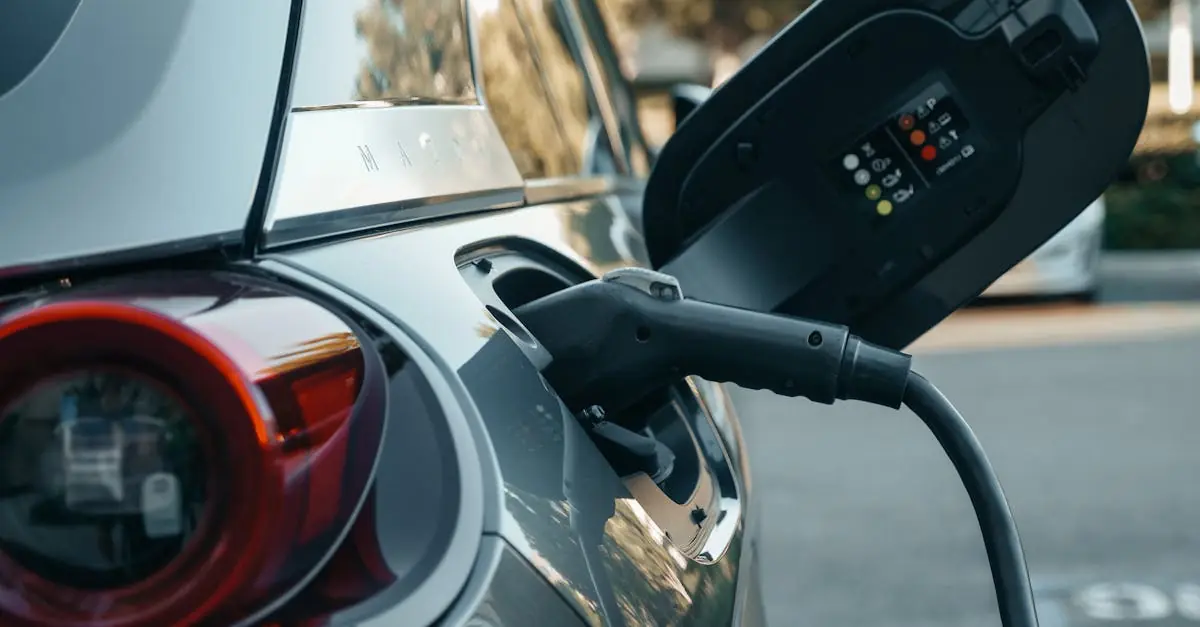Table of Contents
ToggleElectric vehicles are taking the world by storm, but there’s one burning question on everyone’s mind: how long do those battery packs really last? It’s like asking how long a slice of pizza stays delicious—everyone’s got an opinion, but the truth can be a little cheesy.
Overview of EV Battery Packs
Electric vehicle battery packs consist mostly of lithium-ion technology. These packs store and supply energy, making them crucial for powering electric vehicles. Lifespan typically hinges on factors like temperature, charge cycles, and overall usage patterns.
Battery packs sustain performance for an average of 8 to 15 years. Most manufacturers offer warranties spanning 8 years or up to 100,000 miles, indicating their confidence in longevity. Research shows that batteries retain about 70% of their capacity after 8 years, although this can vary based on individual driving habits.
Management systems maintain optimal battery conditions. These systems regulate charge levels, reduce heat, and prevent overcharging, which enhances longevity. Effective charging practices also contribute. Fast charging, while convenient, can accelerate degradation when used excessively. Regularly charging to about 80% instead of 100% helps preserve battery life.
Some advancements boost the lifespan of battery packs. Innovations in chemistry and design may lead to longer-lasting components. Manufacturers are continuously exploring solid-state batteries, which promise better efficiency and enhanced longevity compared to current technologies.
Battery recycling plays a significant role in post-lifespan management. Once battery packs reach the end of their useful life, recycling them can recover valuable materials. This process supports sustainability within the EV market and reduces environmental impact.
Understanding the lifespan of EV battery packs helps consumers make informed choices. Knowledge regarding performance and care can lead to better vehicle ownership experiences.
Factors Affecting Lifespan of EV Battery Packs
Multiple factors influence the lifespan of EV battery packs. Understanding these can help enhance battery longevity.
Temperature Influence
Temperature significantly impacts battery performance and lifespan. High temperatures can accelerate deterioration, leading to reduced capacity over time. Conversely, extremely low temperatures may hinder battery efficiency and overall range. Optimal operating temperatures typically range between 20°C and 25°C, where batteries perform best. Some manufacturers design battery thermal management systems to maintain ideal temperatures, promoting longevity. Keeping the battery within this range often results in improved capacity retention over the years.
Charging Habits
Charging habits play a crucial role in the health of an EV battery. Regularly charging to about 80% rather than 100% can extend lifespan, as it reduces stress on the battery. Fast charging, while convenient, can generate heat and contribute to faster wear if used excessively. Charge frequency also matters; frequent short trips that require constant recharging may negatively affect battery life. Incorporating slower, more efficient charging during off-peak hours helps maximize the battery’s durability.
Depth of Discharge
Depth of discharge refers to how much of the battery’s capacity is used before recharging. Keeping the depth of discharge shallow, ideally between 20% and 80%, can significantly improve battery lifespan. Batteries subjected to deep discharges tend to age more quickly, resulting in reduced overall capacity. Monitoring and managing depth of discharge effectively enhance battery longevity. Consequently, regular charging habits that avoid complete depletion contribute positively to battery health over time.
Typical Lifespan of EV Battery Packs
Understanding the lifespan of EV battery packs helps consumers grasp how long they can expect reliable performance. Most battery packs utilize lithium-ion technology and generally last between 8 to 15 years.
Average Lifespan Estimates
Manufacturers commonly provide warranties for 8 years or up to 100,000 miles. Research shows that after 8 years, batteries retain around 70% of their capacity. Factors like driving habits can influence this figure, but it remains a solid guideline for expected longevity. With advancements in technology, newer models may even surpass these averages, hinting at a promising future for battery endurance.
Variability Across Manufacturers
Different manufacturers design batteries with varying specifications, impacting their longevity. Some brands prioritize durability and offer optimized battery management systems, extending lifespan significantly. Others may sacrifice overall performance for cost efficiency, resulting in shorter lifespans. Consumers often observe that premium brands tend to provide longer-lasting battery packs, reflecting their commitment to sustainability and quality. Understanding these differences equips consumers to make better-informed decisions.
Enhancing Lifespan of EV Battery Packs
Improving the lifespan of EV battery packs involves understanding maintenance practices and benefiting from technological advancements. Awareness of best practices can significantly extend battery life.
Maintenance Tips
Regular maintenance enhances battery health. Keeping battery packs at optimal temperatures between 20°C and 25°C promotes longevity. Charging to about 80% instead of a full charge is beneficial. Avoiding excessive fast charging can also reduce wear on battery cells. Monitoring depth of discharge is crucial; maintaining levels between 20% and 80% helps preserve capacity. Implementing these habits results in longer-lasting battery performance.
Technological Advances
Innovations in battery technology continue to emerge. Advanced lithium-ion chemistry now offers better energy density and longevity. Manufacturers also explore solid-state batteries that promise increased efficiency. Enhanced thermal management systems can regulate temperature, further improving battery performance. Battery management systems now monitor health and optimize charging cycles automatically. These developments reshape the landscape of EV batteries, ultimately leading to longer-lasting energy solutions for consumers.
The lifespan of EV battery packs is a vital consideration for anyone contemplating an electric vehicle. With advancements in technology and effective management practices, consumers can expect improved longevity and performance from their batteries. Understanding the factors that influence battery life empowers drivers to make informed choices that enhance their ownership experience.
As the EV market continues to evolve, ongoing innovations will likely lead to even more durable and efficient battery solutions. Staying informed about battery care and the latest developments in technology will ensure that drivers can maximize the benefits of their electric vehicles while contributing to a more sustainable future.







